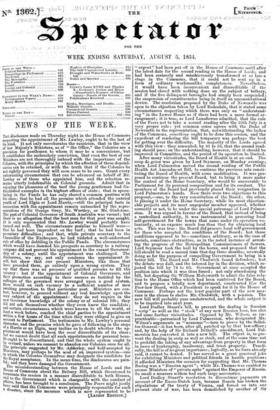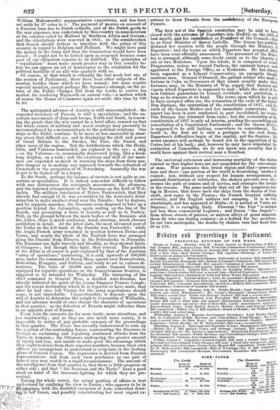NEWS OF THE WEEK.
THE disclosure made on Thursday night in the House of Commons respecting the appointment of Mr. Lawley, ought to be the last of its kind. It not only corroborates the suspicion, that in the view of her Majesty's Ministers, as of " the Office," the Colonies are a provision for gentlemen to whom it may be a convenience, but it establishes the melancholy conviction, that even the best of our Ministers are not thoroughly imbued with the importance of the Colonies, with the principles by which the affection of these depend- encies can be retained, or with the truth that if the Colonies be not rightly governed they will soon cease to be ours. Grant every extenuating circumstanoe that can be advanced on behalf of Mr. Lawley or of those who appointed him, and the selection re- mains utterly indefensible on Colonial grounds. Admit that in enjoying the pleasures of the turf the young gentleman had dis- tinguished examples in the highest offices of state; that in specu- lating in the Funds he has only shared a common pastime with his class; that he had all the promise which attended the untried path of Lord Elgin or Lord Harris,—still the principal facts in connexion with the appointment remain untouched by the repre- sentations of Sir George Grey, Mr. Wortley, or Mr. Gladstone. The post of Colonial Governor of South Australia was vacant; but there is no allegation that the best man for that post was sought. It is only represented that Mr. Lawley would probably have tamed out well. The eircumstanoes peendiar to himself were— that he had been imprudent on the turf; that he had been in pecuniary difficulties; and that, while private secretary to the Chancellor of the Exchecluer, he had, violated a well-understood rule of office by dabbling in the Public Funds. The circumstances which would have damned his prospects as secretary to a railway company did not prevent his appointment to the vacant Governor- ship of a colony, until the appointment was challenged. The disclosures; we say; not only condemn the appointment it- self, but show that our present Ministers, like those that have preceded them, go entirely upon a wrong system. They say that there was no pressure of qualified persons to fill the vacancy: but if the appointment of Colonial Governors, and their promotion according to their success as testified by the suffrages of the governed were arranged upon a good system, there would on each vacancy be a sufficient number of men awaiting promotion to that particular post. Ministers are con- tent, however, to proceed without any real knowledge upon the very subject of the appointment: they do not require in the new Governor knowledge of the colony or of colonial life; they did not ask themselves whether they even knew the candidate; and certain circumstances which were known to all the world, at least a week before, reached the chief parties to the appointment Within a few hours of the time when they were obliged to give an account to Parliament. The testimonies to Mr. Lawley's personal character, and the promise which he gave of following in the steps of a Earns or an Elgin, may incline us to doubt whether the ap- pointment would have been the most discreditable of its class; hut we cannot doubt that all such appointments for personal bene- fit ought to be discontinued, and that the whole system ought to be revised, Videss weoonsent to abandonour Colonies once for all. ih.e.Prillotple suggested -by Mr: Adderley, and half-accepted by . misters, may perhaps be the seed of an improved system—one in which the Colonies themselves' may designate the candidate for tile Itclal acceptance. In the mean time, the disclosures are pain- ful; and they have damaged the Government. The misunderstanding between the House of Lords and the °use of Commons about the Bribery Bill, which threatened to taenrennate the session in a manner discreditable to both Houses, ja.to the Government, which is chargeable with the conduct of !nus been brought to a conclusion. The Peers might justly r Nun that the Commons were principally responsible for such a °muter, since the measure which is , now represented to be trATEST EDITION.] " urgent" had been put off in the House of Commons until after the latest date for the second reading in the House of Lords, and had been seriously and mischievously transformed at so late a stage in the Commons, that it could not be sent up in a form of ordinary workmanlike completeness. Nevertheless, it would have been inconvenient and discreditable if the session had closed with nothing done en the subject of bribery, and if the five delinquent boroughs had simply been suspended; the suspension of constituencies being in itself an unconstitutional device. The resolution proposed by the Duke of Newcastle was open to the objection taken by Lord Redesdtde, that it stated some circumstances respecting which there was only an "understand- ing " in the Lower House as if there had been a more formal ar- rangement; it is true, as Lord Lansdowne admitted, that the rule of the Peers not to take a second reading after the 25th July is a very proper rule; yet common sense agrees with the Duke of Newcastle in the representation, that, notwithstanding the laches of the Commons, something ought to be done this session, and the expedient of rendering the bill temporary was perhaps the best for getting over the difficulty. The majority of the Lords agreed with this view: they consented, by 41 to 33, that the second read- ing should pass; on the understanding, however, that it should be improved in Committee, and the period of its operation be limited. After many vicissitudes, the Board of Health is at an end. The coup de grace was given by Lord Seymour, on Monday evening; when Lord Palmerston moved the second reading of the Public Health Act Amendment Bill, to continue the previous acts consti- tuting the Board of Health, with some modification. It was pro- posed to continue the present Board, but to bring it more Willer the control of the Home Secretary, who would be answerable to Parliament for its personal composition and for its conduct. The members of the Board had previously placed their resignation in Lord Palmerston's hands. Now there were two objections to this proposal,—one, to the very constitution of the Board; the other, to placing it under the Home Secretary, while its most objection- able projects and its most unpopular member appeared, whether correctly or not, fo be under the special patronage of Lord Palmer- ston. It was argued in favour of the Board, that instead of being a centralized authority, it was instrumental in procuring local. self-goveritment for the towns that came under its operation vo- luntarily, at an expense much less than that for obtaining local acts. This was true: the Board did procure local self-government for those who accepted the conditions of the Board; but those conditions appeared to be—sometimes arbitrary, as in the case of burials, sometimes obstructive, as in the noted instance of arrest- ing the progress of the Metropolitan Commissioners of Sewers. Lord Seymour took the bull by the horns, and proposed that the bill should be read a second time that day three months; avowedly doing so for the purpose of compelling Government to bring in a better bill. The Board and Mr. Chadwick found defenders; but the debate was dull, and the interest lay in the division, which re- jected the bill by 74 to 65. Government at once accepted the position into which it was thus forced; not only abandoning the bill, but deputing Sir William Molesworth to admit the false rela- tion to the Home Office which had been contrived for the Board, and to propose a totally new department, constructed like the Poor-law Board, with a President to speak for it in the House of Commons. Perhaps not the least popular part of the new mea- sure is the clause to shelve Mr. Chadwick, with a pension. The new bill will probably pass unobstructed, and the whole subject is to be inquired into next year. Lord Dudley Stuart's bill, to prevent the dealing in Russian " scrip" as well as the "stock" of any new Russian loan, has also had some further vicissitudes. Opposed by Mr. Wilson, as im- practicable—patronized by Lord Palmerston, who designated Mr. Wilson's arguments as "nonsense "—torn to pieces by the Solici- tor-General—it has been, after all, patched up by that law-officer ; and, by the help of Sir Richard Bethell's amendment, Lord Pal- merston has converted it into a new bill. The object is, to pre- vent the dealing in scrip as well as stock, and at the same time not to prohibit the taking of any advantage from property in that form in cases of bankruptcy, insolvency, and trust property. Practi- cally, the bill is of no great importance; logically, as we have already said, it cannot be denied. It has served as a great practical joke for exhibiting Ministers and political friends in hostile positions; it afforded Ministers the occasion for suggesting that Mr. Thomas Baring was a "Russian agent"; while Mr. Thomas was enabled to accuse Ministers of " private spite" against the Emperor of Russia. So small a measure seldom had such large accessories.
Lord Dudley Stuart's resolution to discontinue payments on account of the Russo-Dutch loan, because Russia has broken the stipulations of the treaty of Vienna, and forced us into our present state of war, has been demolished by another of Sir William Molesworth's argumentative expositions, and has been set aside by 57 votes to 5.. The payment of monies on account-of a Russian loan due to Dutch subjects, and of the Dutch quota to the war expenses, was undertaken by this country in consideration of the colonies ceded by Holland in Southern Africa and Guiana; and the stipulations were renewed in 1831, on the consideration that Russia should forbear to interfere with the policy of this country in regard to Belgium and Holland. We might have paid the money in the lump and then. the transaction would have been closed ; it ought not to be looked upon as reopened because some part of our obligation remains to be fulfilled. The principles of " repudiation " must make much greater way in this country be- fore we can oppose an act of bankruptcy as the retaliation for the political hostility of an ally who quarrels with us. Of course, in that which is virtually the last week but one of the session of Parliament, there have been other subjects of dis- cussion besides those which we have named; but none require especial mention, except perhaps Mr. Spooner's attempt, on the re- turn of the Public Charges Bill from the Lords, to revive his motion for rendering Maynooth an annual vote,—a motion which of course the House of Commons again set aside, this time by 108 to 43.



























 Previous page
Previous page